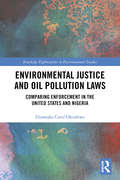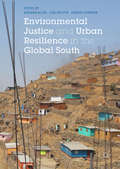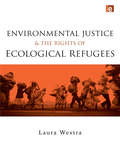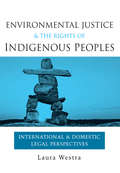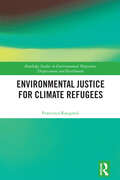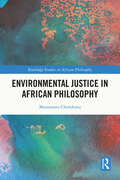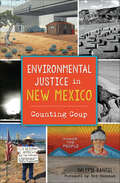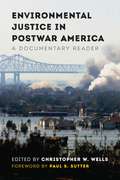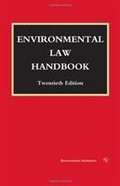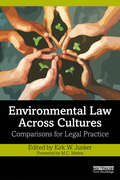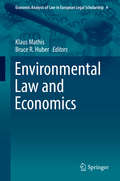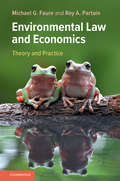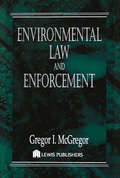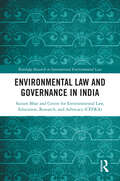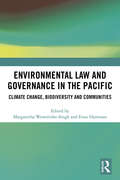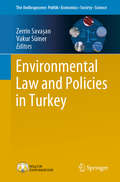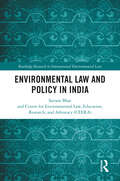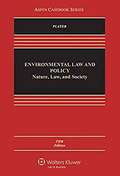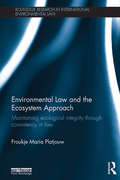- Table View
- List View
Environmental Justice and Oil Pollution Laws: Comparing Enforcement in the United States and Nigeria (Routledge Explorations in Environmental Studies)
by Eloamaka Carol OkonkwoThis book explores the relationship between oil pollution laws and environmental justice by comparing and contrasting the United States and Nigeria. Critically, this book not only examines the fluidity of oil pollutions laws but also how effective or ineffective enforcement can be when viewed through the lens of environmental justice. Using Nigeria as a case study and drawing upon examples from the United States, it examines the legal and institutional challenges impacting upon the effective enforcement of laws and provides a contrasting view of developed and developing countries. Focusing on the oil and gas industry, the book discusses the laws and international acceptable standards (IAS) in these industries, the principles behind their application, the existing barriers to their effective implementation, and how to overcome those barriers. Utilising an environmental justice framework, the book demonstrates the synergy between policy-making, human rights, and justice in oil-producing regions as well as addressing the importance of protecting the rights of minorities. Through a comparative analysis of the United States and Nigeria, this book draws out enforcement approaches and mechanisms for tackling oil-related pollution with a view to reducing environmental injustice in developing countries. Examining the role of NGOs in pursuing environmental justice matters, the book showed the regional courts as one avenue of overcoming the enforcement challenges faced by the developing countries. This book will be of great interest to students and scholars of environmental law, environmental justice, minorities' rights, business and human rights, energy law, and natural resource governance.
Environmental Justice and Urban Resilience in the Global South
by Adriana Allen Liza Griffin Cassidy JohnsonThis edited volume provides a fresh perspective on the important yet often neglected relationship between environmental justice and urban resilience. Many scholars have argued that resilient cities are more just cities. But what if the process of increasing the resilience of the city as a whole happens at the expense of the rights of certain groups? If urban resilience focuses on the degree to which cities are able to reorganise in creative ways and adapt to shocks, do pervasive inequalities in access to environmental services have an effect on this ability? This book brings together an interdisciplinary and intergeneration group of scholars to examine the contradictions and tensions that develop as they play out in cities of the Global South through a series of empirically grounded case studies spanning cities of Asia, Latin America, Africa and Eastern Europe.
Environmental Justice and the Rights of Ecological Refugees
by Laura WestraClimate change and other environmental problems are increasingly leading to the displacement of populations from their homelands, whether through drought, flooding, famine or other causes. Worse, there is currently no protection in international law for people made refugees by such means. Following on from her previous explorations of environmental justice as it relates to future generations and indigenous peoples, Laura Westra now turns her attention to the plight of ecological refugees. In Part I, Westra provides an overview of what defines an ecological refugee and their present legal status. Part II goes into greater depth as to who the vulnerable are and what protection they have in international law. Part III looks to the future, advocating a comprehensive approach to the problem. With extensive examples and analysis, this is a compelling treatment that will be indispensable for legal professionals, government and business leaders, academics and students of the role of law in the protection of the rights of refugees.
Environmental Justice and the Rights of Indigenous Peoples: International and Domestic Legal Perspectives
by Laura WestraMore than 300 million people in over 70 countries make up the worlds indigenous populations. Yet despite ever-growing pressures on their lands, environment and way of life through outside factors such as climate change and globalization, their rights in these and other respects are still not fully recognized in international law. In this incisive book, Laura Westra deftly reveals the lethal effects that damage to ecological integrity can have on communities. Using examples in national and international case law, she demonstrates how their lack of sufficient legal rights leaves indigenous peoples defenceless, time and again, in the face of governments and businesses who have little effective incentive to consult with them (let alone gain their consent) in going ahead with relocations, mining plans and more. The historical background and current legal instruments are discussed and, through examples from the Americas, Africa, Oceania and the special case of the Arctic, a picture emerges of how things must change if indigenous communities are to survive. It is a warning to us all from the example of those who live most closely in tune with nature and are the first to feel the impact when environmental damage goes unchecked.
Environmental Justice for Climate Refugees (Routledge Studies in Environmental Migration, Displacement and Resettlement)
by Francesca RosignoliThis book explores who climate refugees are and how environmental justice might be used to overcome legal obstacles preventing them from being recognized at an international level. Francesca Rosignoli begins by exploring the conceptual and complex issues that surround the very existence of climate refugees and investigates the magnitude of the phenomenon in its current and future estimates. Reframing the debate using an environment justice perspective, she examines who has the responsibility of assisting climate refugees (state vs non-state actors), the various legal solutions available and the political scenarios that should be advanced in order to govern this issue in the long term. Overall, Environmental Justice for Climate Refugees presents a critical interrogation of how this specific strand of forced migration is currently categorized by existing legal, ethical and political definitions, and highlights the importance of applying a justice perspective to this issue. Exploring the phenomenon of climate refugees through a multi-disciplinary lens, this book will be of great interest to students and scholars of environmental migration and displacement, environmental politics and governance, and refugee studies.
Environmental Justice in African Philosophy (Routledge Studies in African Philosophy)
by Munamato ChemhuruThis book focuses on environmental justice in African philosophy, highlighting important new perspectives which will be of significance to researchers with an interest in environmental ethics both within Africa and beyond. Drawing on African social and ethical conceptions of existence, the book makes suggestions for how to derive environmental justice from African philosophies such as communitarian ethics, relational ethics, unhu/ubuntu ethics, ecofeminist ethics and intergenerational ethics. Specifically, the book emphasises the ways in which African philosophies of existence seek to involve everyone in environmental policy and planning and to equitably distribute both environmental benefits (such as natural resources) and environmental burdens (such as pollution and the location of mining, industrial or dumping sites). This extends to fair distribution between global South and global North, rich and poor, urban and rural populations, men and women and adults and children. These principles of humaneness, relationships, equality, interconnectedness and teleologically oriented existence among all beings are important not only to African environmental justice but also to the environmental justice movement globally. The book will interest researchers and students working in the fields of environmental ethics, African philosophy and political philosophy in general.
Environmental Justice in New Mexico: Counting Coup (Natural History)
by Valerie RangelIn New Mexico and across America, communities of color bear the brunt of contamination from generations of expansion, mining, nuclear testing and illegal dumping. The nation's largest uranium waste spill occurred in 1979 at Church Rock, and radioactivity in the Rio Puerco remains at dangerous levels. The National Trust for Historic Preservation listed Mount Taylor as one of the ten most endangered historic sites in America. After decades of sickness from Rio Grande river water, the first female governor of a Pueblo Nation, Verna Olgin Teller, led tribal members to a Supreme Court victory over Albuquerque. Valerie Rangel presents stories of strife and struggle in the war to protect the integrity of natural systems, rights to religious freedom and the continuation of traditional customs.
Environmental Justice in Postwar America: A Documentary Reader (Weyerhaeuser Environmental Classics)
by Christopher Wells Paul Sutter<p>In the decades after World War II, the American economy entered a period of prolonged growth that created unprecedented affluence'but these developments came at the cost of a host of new environmental problems. Unsurprisingly, a disproportionate number of them, such as pollution-emitting factories, waste-handling facilities, and big infrastructure projects, ended up in communities dominated by people of color. Constrained by long-standing practices of segregation that limited their housing and employment options, people of color bore an unequal share of postwar America's environmental burdens. <p>This reader collects a wide range of primary source documents on the rise and evolution of the environmental justice movement. The documents show how environmentalists in the 1970s recognized the unequal environmental burdens that people of color and low-income Americans had to bear, yet failed to take meaningful action to resolve them. Instead, activism by the affected communities themselves spurred the environmental justice movement of the 1980s and early 1990s. By the turn of the twenty-first century, environmental justice had become increasingly mainstream, and issues like climate justice, food justice, and green-collar jobs had taken their places alongside the protection of wilderness as ?environmental? issues. <p>Environmental Justice in Postwar America is a powerful tool for introducing students to the US environmental justice movement and the sometimes tense relationship between environmentalism and social justice.</p>
Environmental Justice: Issues, Policies, and Solutions
by Jamal Kadri Robert Wolcott William Drayton Deeohn Ferris Roger Bezdek Kelly AlleyIn Environmental Justice, leading thinkers of the environmental justice movement take a direct look at the failure of "top down" public policy to effectively deal with issues of environmental equity.The book provides a startling look at pressing social and environmental problems and charts a course for future action. Among the topics considered are: the history of the social justice movement the role of the professional in working with community groups methods of dealing with environmental problems at the international level participatory national policy for environmental education, energy, industrial development, and housing and sustainable development.Contributors include Robert Bullard, Deeohn Ferris, Tom B.K. Goldtooth, David Hahn-Baker, Beverly Wright, Ivette Perfecto, Patrick West, and others.
Environmental Law
by Daniel M. Steinway Baker Botts Buchanan Patterson William F. Brownell Karen J. Nardi David R. Case Kevin A. EwingThe environmental field and its regulations have evolved significantly since Congress passed the first environmental law in 1970, and the Environmental Law Handbook, published just three years later, has been indispensable to students and professionals ever since. The authors provide clear and accessible explanations, expert legal insight into new and evolving regulations, and reliable compliance and management guidance.
Environmental Law Across Cultures: Comparisons for Legal Practice
by Kirk W. Junker M. C. MehtaThis book provides a practical, functional comparison among various institutions, tools, implementation practices and norms in environmental law across legal cultures. This is a new approach that focuses on the act of comparison, looking at legal practice, from the ground up, including the perspective of citizens. Most literature on comparative environmental law either focuses on a two-way comparison of state jurisdictions or simply juxtaposes environmental features of two or more state jurisdictions without engaging in any analysis of the comparison. However, this book treats legal cultures as the objects of comparison as it provides practical comparisons among various institutions, tools and norms in environmental law. The arrangement and organisation of the material reverses the more traditional presentation of comparative environmental law as a series of countries within which separate descriptions are respectively presented. In this book the reader is presented with environmental legal themes, with examples and case studies drawn from various cultures that are compared in order to help understand the theme. Case studies draw on the authors’ experiences in a range of legal cultures, including in Australia, Brazil, China, Chile, Ethiopia, Germany, India, Nigeria, Slovakia, and the USA. The comparative nature of the book allows domestic professionals to develop skills to enable them to understand and advocate broader contexts for clients, and helps students become more aware of specific legal systems while questioning why their own system functions (or does not function) as it does. The book is aimed at advanced undergraduate and postgraduate students of environmental law as well as researchers and practitioners.
Environmental Law And Policy (Concepts And Insights)
by James Salzman Barton ThompsonEnvironmental Law and Policy is a user-friendly, concise, inexpensive treatment of environmental law. Written to be read pleasurably rather than used as a dry reference source, the authors provide a broad conceptual overview of environmental law while also explaining the major statutes and cases. The updated text also describes initiatives launched by the Trump administration. The first part of the book provides an engaging discussion of the major themes and issues that cross-cut environmental law. The second part of the book examines the substance of environmental law, with separate sections on each of the major statutes. The third part of the book describes natural resources law, discussing endangered species conservation, wetlands protection, water and energy issues. Part four addresses environmental impact statements and the National Environmental Policy Act. The book has wide adoption, not only in law schools, but also in graduate and undergraduate classes outside law school.
Environmental Law Before the Courts: A US-EU Narrative
by Luc Lavrysen Maria Vittoria Ferroni Giovanni Antonelli Michael Gerrard Sara Colangelo Giancarlo Montedoro Maurizio SantiseThis book sheds light on the latest trends in environmental law by analyzing some of the main sectors of law, including administrative law, constitutional law, EU law, US Law, and human rights law. It explores the evolution of these sectors before courts and tribunals from a US-EU perspective and from the perspectives of some of the foremost academics and justices from the major jurisdictions.Supranational and national courts, both in Europe and in the US, have delivered significant environmental judgements in recent years. The corresponding case law reflects how, in many jurisdictions, environmental and climate litigation continues to expand exponentially as a tool to strengthen environmental protection, whether by pushing national governments to be more ambitious or by enforcing existing statutes and regulations.Courts, particularly after the Paris Agreement, are increasingly seeking their own role as an important player in multilevel environmental governance. Courts in both the US and EU are at the forefront of this process and their role in shaping environmental rule of law will be fundamental in the near future.
Environmental Law and Contrasting Ideas of Nature
by Keith H. HirokawaLaw's ideas of nature appear in different doctrinal and institutional settings, historical periods, and political dialogues. Nature underlies every behavior, contract, or form of wealth, and in this broad sense influences every instance of market transaction or governmental intervention. Recognizing that law has embedded discrete constructions of nature helps in understanding how humans value their relationship with nature. This book offers a scholarly examination of the manner in which nature is constructed through law, both in the 'hard' sense of directly regulating human activities that impact nature, and in the 'soft' manner in which law's ideas of nature influence and are influenced by behaviors, values, and priorities. Traditional accounts of the intersection between law and nature generally focus on environmental laws that protect wilderness. This book will build on the constructivist observation that when considered as a culturally contingent concept, 'nature' is a self-perpetuating and self-reinforcing social creation.
Environmental Law and Economics
by Klaus Mathis Bruce R. HuberThis anthology discusses important issues surrounding environmental law and economics and provides an in-depth analysis of its use in legislation, regulation and legal adjudication from a neoclassical and behavioural law and economics perspective. Environmental issues raise a vast range of legal questions: to what extent is it justifiable to rely on markets and continued technological innovation, especially as it relates to present exploitation of scarce resources? Or is it necessary for the state to intervene? Regulatory instruments are available to create and maintain a more sustainable society: command and control regulations, restraints, Pigovian taxes, emission certificates, nudging policies, etc. If regulation in a certain legal field is necessary, which policies and methods will most effectively spur sustainable consumption and production in order to protect the environment while mitigating any potential negative impact on economic development? Since the related problems are often caused by scarcity of resources, economic analysis of law can offer remarkable insights for their resolution. Part I underlines the foundations of environmental law and economics. Part II analyses the effectiveness of economic instruments and regulations in environmental law. Part III is dedicated to the problems of climate change. Finally, Part IV focuses on tort and criminal law. The twenty-one chapters in this volume deliver insights into the multifaceted debate surrounding the use of economic instruments in environmental regulation in Europe.
Environmental Law and Economics: Theory and Practice
by Michael G. Faure Roy A. PartainIn Environmental Law and Economics, Michael G. Faure and Roy A. Partain provide a detailed overview of the law-and-economics methodology developed and employed by environmental lawyers and policymakers. The authors demonstrate how this approach can transcend political divisions in the context of international environmental law, environmental criminal law, and the property rights approach to environmental law. Private law solutions and public regulatory approaches are also explored, including traditional command-and-control and market-based forms of regulation. The book not only shows how the law-and-economics framework can be used to protect the environment, but also to examine deeper questions involving environmental federalism and the effectiveness of environmental law in developing economies. In clear, digestible prose that does not require readers to possess a background in microeconomics or mathematics, the authors introduce the theory and practice of environmental law and economics that have been so critical in the creation of robust environmental policy.
Environmental Law and Enforcement
by Gregor I. McGregorAmid all the laws and regulations on environmental protection and worker safety, what is the responsible business or landowner to do? What should the responsible consultant advise? Environmental Law and Enforcement provides you with a practical guide that takes the mystery out of environmental law and related land use controls.The author provides a synopsis of major environmental topics from A to Z and features citations to the major federal statutes in the United States Code (USC) and the Code of Federal Regulations (CFR) so you can easily find governing statutes and regulations. Special sections discuss the use of experts in case preparation and how to be an effective case witness. A checklist for compliance with the National Environmental Policy Act is included. The book covers strategies to cope with landowner liability for hazardous waste, consultant liability for mistakes in hazardous waste site assessments, and guidelines for emergency managers to minimize legal liability. The section on insurance liability provides practical approaches to dealing with insurance companies on hazardous waste claims. The successful organization will manage for environmental protection as a corporate goal, and consequently stays ahead of new government requirements-away from lawyers and lawsuits-and ahead of the competition. Environmental Law and Enforcement gives you the tools you need to achieve this mission.
Environmental Law and Governance in India (Routledge Research in International Environmental Law)
by Sairam BhatThis book provides an insightful and holistic up-to-date perspective of the constitutional governance and legal framework in India with regard to environmental protection.Covering the foundational principles of environmental law, the book details the current status of international environmental law in the face of complex environmental challenges including climate change. The topics covered include water resource governance, and coastal regulation, with a particular focus on the growing significance of the National Green Tribunal. It also covers the wide range of policies that have been introduced over the past 50 years and the impact these have had.The book will be of interest to researchers, legal practitioners, and scholars in the field of environmental law and governance as well as international law.
Environmental Law and Governance in the Pacific: Climate Change, Biodiversity and Communities
by Margaretha Wewerinke-Singh Evan HammanThis volume examines environmental law and governance in the Pacific, focusing on the emerging challenges this region faces. The Pacific is home to some of the world’s most astonishing biological and cultural diversity. At the same time, Pacific Island nations are economically and technically under-resourced in the face of tremendous environmental challenges. Destructive weather events, ocean acidification, mining, logging, overfishing, and pollution increasingly degrade ecosystems and affect fishing, farming, and other cultural practices of Pacific Islanders. Accordingly, there is an urgent need to understand and analyse the role of law and governance in responding to these pressures in the Pacific. Drawing on academic and practitioner expertise from the Pacific region, as well as Europe and the United States, this unique collection navigates the major environmental law and governance challenges of the present and future of the Pacific. Environmental Law and Governance in the Pacific discusses 21 Pacific Island countries and territories, including Cook Islands, Fiji, Papua New Guinea, Solomon Islands, Vanuatu, and Samoa, and a broad range of themes, such as deep-sea mining, wetlands and mangroves, heritage, endangered species, human rights, and access to justice, are addressed, thus providing a comprehensive and state-of-the-art overview of environmental law and governance within specific jurisdictions as well as across the Pacific region as a whole. This volume will be essential reading for students and scholars interested in environmental law and governance in the Pacific region, as well as policy-makers, practitioners and NGOs involved in the development and implementation of environmental law and policy.
Environmental Law and Policies in Turkey (The Anthropocene: Politik—Economics—Society—Science #31)
by Vakur Sümer Zerrin SavaşanThis book aims to provide a general systematic analysis of key issues of Turkish environmental law and policies and to highlight the related concerns and challenges. Its chapters provide a historical perspective and general understanding of the legal settings of Turkish Environmental Law; offer an overall understanding of the evolving and prevailing paradigms of legislation and administrative practices in environmental policy in Turkey; explain how EIA has become the main environmental management tool and instrument of environmental compliance in Turkey; discuss the project process, challenges and results of the EU-funded project ‘Turkey’s Map of Environmental Violations’ and food security in Turkey; and present a picture of environmental justice movements from bottom-up over the establishment and operation of small-scale hydroelectricity power plants.Thus, with its comprehensive coverage of up-to-date information and findings enabling the reader to understand the topic in full analyses of key themes in Turkish environmental law and policies, addressing, in separate chapters, concepts like environmental justice, food security, environmental compliance, environmental impact assessment (EIA), and environmental cases in Turkey in detail multidisciplinary approach enabling readers to learn about the topic in a holistic mannerit aims to be:• a valuable source of information about Turkish environmental law and policies• an effective tool to support teaching and research on Turkish environmental law and policies• an aid to decision-making on Turkish environmental issues• an important resource for graduate and postgraduate research students and policymakers working on Turkish environmental law and policies Given there is no competitive book on the market with similar coverage, it makes a meaningful contribution to Turkish environmental scholarship
Environmental Law and Policy (Concepts and Insights)
by James Salzman Barton H. ThompsonEnvironmental Law and Policy is a user-friendly, concise, inexpensive treatment of environmental law. Written to be read pleasurably rather than used as a dry reference source, the authors provide a broad conceptual overview of environmental law while also explaining the major statutes and cases. A series of problem exercises have been added throughout the book, describing a legal or policy conflict in detail and asking students to identify and assess solutions. The first part of the book provides an engaging discussion of the major themes and issues that cross-cut environmental law. The second part of the book examines the substance of environmental law, with separate sections on each of the major statutes. The third part of the book describes natural resources law, discussing endangered species conservation, wetlands protection, water and energy issues. Part four addresses environmental impact statements and the National Environmental Policy Act.
Environmental Law and Policy (Concepts and Insights)
by James Salzman Barton Thompson Jr.Environmental Law and Policy is a user-friendly, concise, affordable treatment of environmental law. Written to be highly readable and enjoyable rather than a dry reference source, the book provides a broad conceptual overview of environmental law while also explaining the major statutes and cases. The book includes multiple problem exercises, describing a legal or policy conflict in detail and asking students to identify and assess solutions. The new edition is fully updated to include policy initiatives of the Biden Administration, important recent Supreme Court decisions through the 2023-2024 term (Sackett, Loper Bright Enterprises, Jarkesy, Cedar Point Nursery), and the emerging role of Native American tribes in environmental law. The first part of the book provides an engaging discussion of the major themes and issues that cross-cut environmental law, including a new problem exercise on the Rights of Nature. The second part of the book examines the substance of environmental law, with separate sections on each of the major statutes. The third part of the book discusses important issues of natural resources law, including the public trust doctrine, endangered species conservation, wetlands protection, and energy issues. Part four addresses environmental impact statements and the National Environmental Policy Act. The book is one of the most widely adopted environmental texts not only in law schools but in both undergraduate and graduate classes.
Environmental Law and Policy in India (Routledge Research in International Environmental Law)
by Sairam BhatThis book focuses on administrative regulation in environmental law. It also focuses on climate change, and the push for sustainability.Covering the regulation on forest conservation, wildlife protection, water pollution, air pollution, and noise pollution, the book looks into the practical application of environmental legislation. This includes responses to international environmental agreements within India and the economic impact. It also discusses historical jurisprudence, and the administrative frameworks existing as a result of this.Focusing on contemporary issues within the legal landscape, the book aims to provide a solid foundation for researchers, legal practitioners, and scholars in the field of environmental law and policymaking.
Environmental Law and Policy: Nature, Law, and Society (Aspen Casebook)
by Lisa Heinzerling Zygmunt J. B. Plater Robert H. Abrams Robert L. Graham David A. Wirth Noah D. HallEnvironmental Law & Policy: Nature, Law & Society is a coursebook designed to access the law of environmental protection through a “taxonomic” approach, exploring the range of legal structures and legal methodologies of the field—rather than simply designing it according to air, water, toxics, etc. as subject media (which often results in duplicative legal coverage). All the major subject areas of pollution and resource conservation are covered, but they are covered according to the legal approaches they represent. <p><p> The book is “Saxist,” because it originally arose and continues to carry on themes from the teaching, guidance, and writings of the late Joseph Sax, the eminent pioneer of the environment law field who emphasized the interaction between common law and public law statutory structures, and introduced the public trust doctrine as a thread undergirding and running through the entire field of environmental law.
Environmental Law and the Ecosystem Approach: Maintaining ecological integrity through consistency in law (Routledge Research in International Environmental Law)
by Froukje Maria PlatjouwThe ecosystem approach embodies a concept of the environment which emphasizes the integrated components of nature as complex adaptive systems. This book examines the relationship between the architecture and design of environmental law and the implementation of the ecosystem approach as a means to maintain ecological integrity. The main issue addressed is: in which manner and to what extent does fragmentation and administrative discretion in environmental law impede the implementation of an ecosystem approach? This is explored through analysis of several questions: what is an ecosystem approach and how could it be implemented; how can economic evaluation of ecosystem services contribute to the debate; to what extent is environmental law fragmented and how does this affect the implementation of the ecosystem approach; to what extent does environmental law contain administrative discretion and how does this affect the implementation of the ecosystem approach; is there a need for greater consistency, coherence and a stronger rule of law in environmental law in light of the ecosystem approach? The main focus is on Europe, with additional international comparisons where appropriate. The book concludes by providing a normative portrayal of future environmental law as protective, systemic and predictable.
